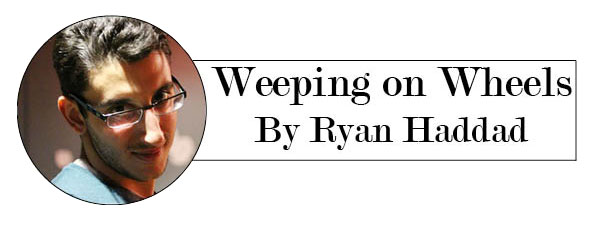I’m going to try to be funny, but I can’t promise anything because I can’t stop crying. I cried five minutes ago making notes for this column. Maybe that’s funny to you. I’m a mess and I need cake.
I’ve been crying about the Tonys every day for the past week. The Tony Awards recognize the greatest achievements of the Broadway season. Some have said the Tonys are like the Super Bowl for theatre nerds. I can’t comment on the accuracy of that comparison because I’m not familiar with the Super Bowl.
I am vaguely aware of Super Bowl commercials and the fact that a minute of advertising time costs millions of dollars because ratings are so high. So I guess the Tonys are not like the Super Bowl at all—ratings for the Tonys are laughably low and every few years executives threaten to pull the telecast from network television. PBS could pick it up, but then Republicans would threaten to defund PBS just to block my gay rights.
I do know that a Super Bowl trophy can’t help you get an EGOT (Emmy, Grammy, Oscar, and Tony).
I’ve mostly been crying because of “Kinky Boots,” a new musical about a drag queen named Lola (Billy Porter) who reinvigorates a shoe factory with sparkling stilettos. Based on that plot description, I avoided the show while in New York for spring break with my mother and aunt. They were perplexed. The flashy billboards all over Times Square boasted a creative collaboration between esteemed playwright Harvey Fierstein and pop-rock sensation Cyndi Lauper.
One afternoon my mother came right out and said, “I walked by the theatre where ‘Kinky Boots’ is playing. Why aren’t we seeing that?”
“Oh, trust me, it’s not going to do well,” I said.
This, ladies and gentlemen, is a lesson in why you should only trust me sometimes. “Kinky Boots” now has the most Tony nominations of the season, 13 in total, and is a major contender for Best Musical, the night’s top prize.
The Tony campaign for “Kinky Boots” has been vigorous and tugs at the heartstrings. My heartstrings are no exception, resulting in tears of regret, shame, and sorrow for not seeing it when I had the chance.
Every time I went to broadwayworld.com this week, the same “Kinky Boots” ad would pop up and I would cry because: a) I can’t stand that the guy doing the voiceover emphasizes the wrong syllable of “Kinky” at the beginning of the video and b) I pompously thought the musical was unworthy of my time. I hadn’t even heard a full song from the show, yet the ad left me sobbing uncontrollably, a part of me hoping that “Kinky Boots” would sweep the Tonys even though I actually saw (and loved) its strongest competitor, “Matilda.”
Let me be clear: I am not an authority on the Tony Awards. I’ve only seen three of the nominated productions. The rest is merely (obsessive) conjecture. First I saw “Matilda,” based on Roald Dahl’s classic novel. With a book by Dennis Kelly and score by Tim Minchin, the musical tells the story of a five-year-old girl who loves books and mischief, but the adults in her life try to stifle her intelligence. Four actresses alternate in the title role (I saw the dynamite Milly Shapiro), and tonight they will receive Special Achievement Tony Awards for their performances.
While reviews for “Kinky Boots” were only lukewarm, critics loved “Matilda.” New York Times theatre critic Ben Brantley called it “the most satisfying and subversive musical ever to come out of Britain.”
In an attempt to compare the two musicals, I listened to the cast recording of “Kinky Boots” since many consider Cyndi Lauper’s score the show’s strongest element. I was underwhelmed. Maybe all the hype has to do with Jerry Mitchell’s direction and choreography, but I found nothing in Lauper’s songs particularly brilliant. Tim Minchin’s music and lyrics for “Matilda” are much more substantive and sophisticated.
The other two nominated productions I saw were both plays. Christopher Durang’s “Vanya and Sonia and Masha and Spike” is a family comedy about three middle-aged siblings whose parents named them after Chekov characters. Hilarity ensues when Masha (Sigourney Weaver), a B-list movie star, returns home for a visit, yet there is great heart and depth amongst the chaos of this farce. Kristine Nielsen’s uproarious turn as Sonia should earn her the Tony for Best Actress in a Play, but she will probably lose to veteran Cicely Tyson in “The Trip to Bountiful.”
Tom Hanks will likely take the Tony for Best Actor in a Play for his Broadway debut in longtime pal Nora Ephron’s play “Lucky Guy.” The play was an utter disappointment for me, even though I desperately wanted to love it. Ephron, one of my favorite writers, died last summer and “Lucky Guy” is her final completed work. A bio-play about controversial tabloid journalist Mike McAlary (Hanks), “Lucky Guy” is a tribute to New York City and the dying form of print journalism, two of Ephron’s greatest loves. Unfortunately, she tried to infuse journalism in the structure of the play, telling us the story via a chorus of reporters instead of showing us the action. The technique proved boring and the entire play suffered as a result.
Voters could go the sentimental route and award Ephron a posthumous Tony, but her problematic script makes this highly doubtful. Expect Christopher Durang to nab Best Play instead, or even Richard Greenberg for his complex drama “The Assembled Parties.”
Here’s a summary of who will probably get each award, who I think should get it and who might surprise us and take it home.
Best Play
Will Win: Christopher Durang, “Vanya and Sonia and Masha and Spike”
Should Win: Christopher Durang, “Vanya and Sonia and Masha and Spike”
Possible Upset: Richard Greenberg, “The Assembled Parties”
Best Musical
Will Win: “Matilda”
Should Win: “Matilda”
Possible Upset: “Kinky Boots”
Best Revival of a Play
Will Win: “Who’s Afraid of Virginia Woolf?”
Should Win: “Who’s Afraid of Virginia Woolf?”
Possible Upset: “The Trip to Bountiful”
Best Revival of a Musical
Will Win: “Pippin”
Should Win: “Pippin”
Best Book of a Musical
Will Win: Dennis Kelly, “Matilda”
Should Win: Dennis Kelly, “Matilda”
Possible Upset: Harvey Fierstein, “Kinky Boots”
Best Original Score
Will Win: Cyndi Lauper, “Kinky Boots”
Should Win: Tim Minchin, “Matilda”
Possible Upset: Tim Minchin, “Matilda”
Best Direction of a Play
Will Win: George C. Wolfe, “Lucky Guy”
Should Win: Nicholas Martin, “Vanya and Sonia and Masha and Spike”
Possible Upset: Pam MacKinnon, “Who’s Afraid of Virginia Woolf?”
Best Direction of a Musical
Will Win: Diane Paulus, “Pippin”
Should Win: Diane Paulus, “Pippin”
Possible Upset: Matthew Warchus, “Matilda”
I didn’t realize how hot this race was until I looked up the nominees for this category! “Matilda” was one of the most magical nights of my theatergoing life, but based on video clips alone, Diane Paulus deserves a Lifetime Achievement Award for her reconceived, circus-themed revival of “Pippin.” Here’s another clip to show you what I mean:
Best Actor in a Play
Will Win: Tom Hanks, “Lucky Guy”
Should Win: Tom Hanks, “Lucky Guy”
Possible Upset: Nathan Lane, “The Nance”
Best Actress in a Play
Will Win: Cicely Tyson, “The Trip to Bountiful”
Should Win: Kristine Nielsen, “Vanya and Sonia and Masha and Spike”
Possible Upset: Amy Morton, “Who’s Afraid of Virginia Woolf?”
Actor in a Musical
Will Win: Billy Porter, “Kinky Boots”
Should Win: Bertie Carvel, “Matilda”
Possible Upset: Bertie Carvel, “Matilda”
Best Actress in a Musical
Will Win: Patina Miller, “Pippin”
Should Win: Patina Miller, “Pippin”
Possible Upset: Laura Osnes, “Cinderella”
Best Featured Actor in a Play
Will Win: Danny Burstein, “Golden Boy”
Should Win: Danny Burstein, “Golden Boy”
Possible Upset: Courtney B. Vance, “Lucky Guy”
This is Danny Burstein’s fourth Tony nomination, and he deserves this one solely for losing last year for “Follies.”
Best Featured Actress in a Play
Will Win: Judith Light, “The Assembled Parties”
Should Win: Judith Light, “The Assembled Parties”
Possible Upset: Shalita Grant, “Vanya and Sonia and Masha and Spike”
Though I loved Shalita Grant’s performance, Judith Light (“Who’s the Boss” and “Ugly Betty”) is poised to win her second consecutive Tony in this category. I cried for her last year and I’ll cry for her again.
Best Featured Actor in in a Musical
Will Win: Terrance Mann, “Pippin”
Should Win: Gabriel Ebert, “Matilda”
Possible Upset: Gabriel Ebert, “Matilda”
Best Featured Actress in a Musical
Will Win: Andrea Martin, “Pippin”
Should Win: Andrea Martin, “Pippin”
Andrea Marin, best known as crazy Aunt Voula in “My Big Fat Greek Wedding,” is set to win her second Tony for her role as Pippin’s grandmother, Berthe. In her six-word Tony nomination story, which can been seen here on Facebook, she writes, “never too late to start living!” Weeps people. Weeps.
The Tonys will air live tonight, Sunday, June 9 on CBS at 8 p.m. eastern. For my live blog of the telecast, follow @ryanjhaddad on Twitter or weepingonwheels.tumblr.com.

















